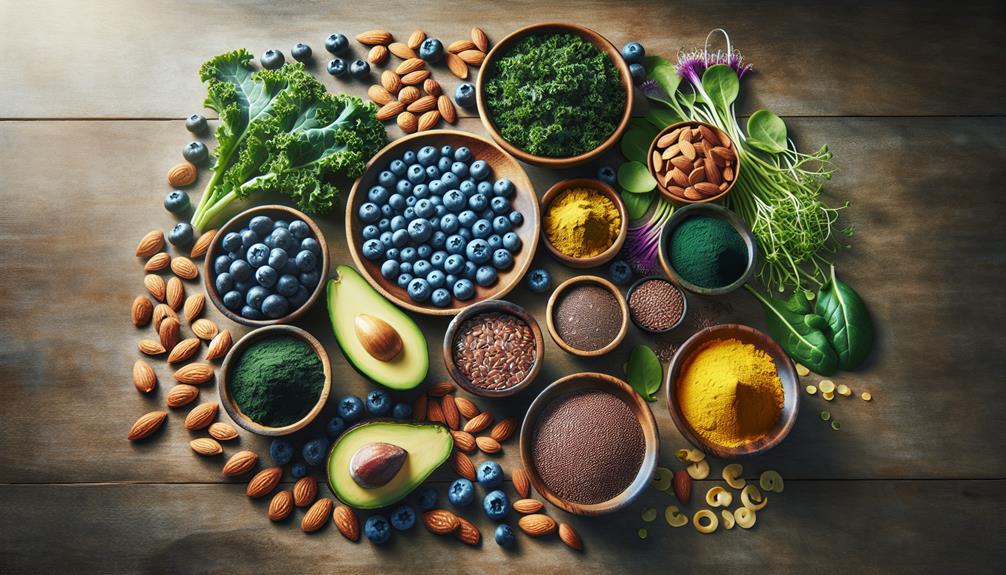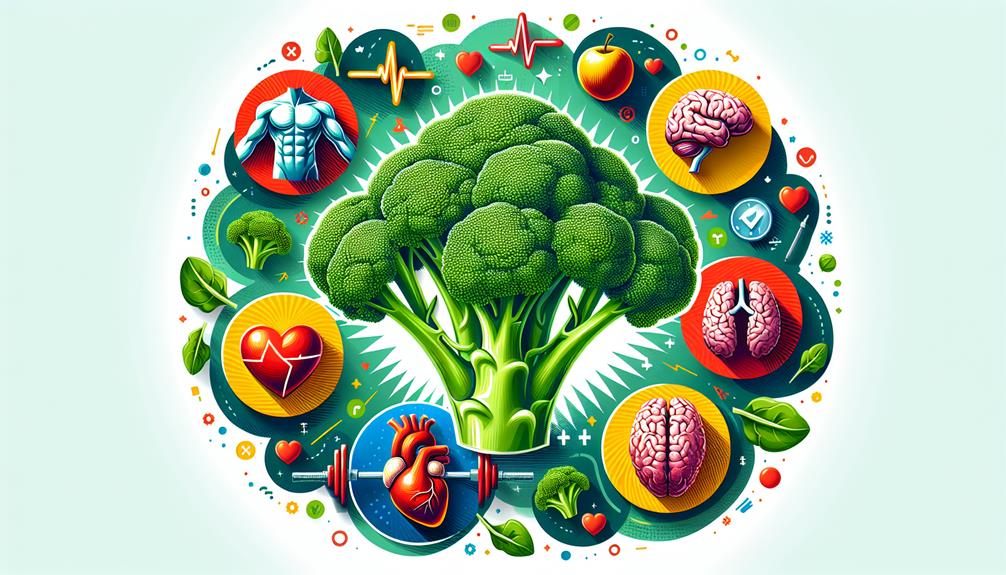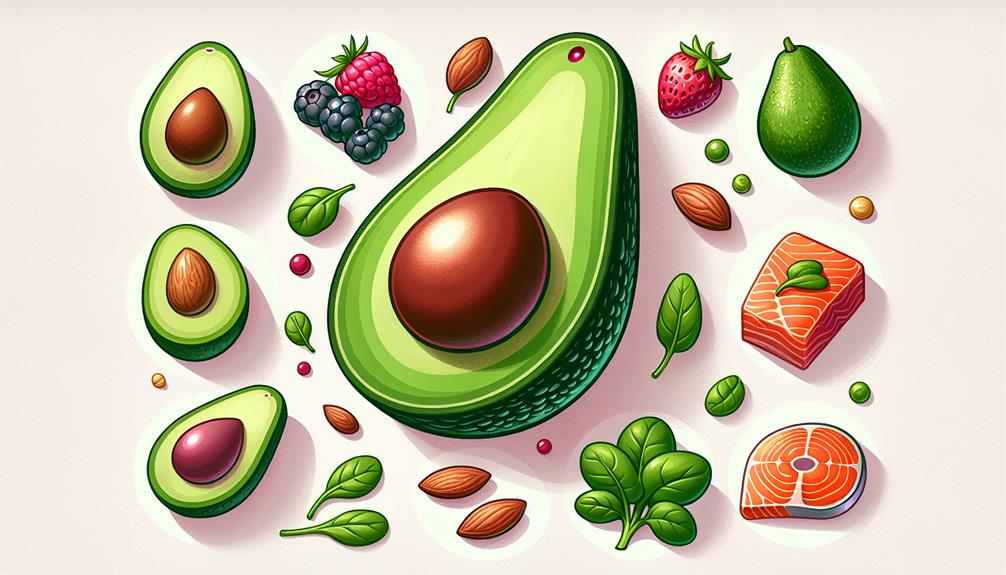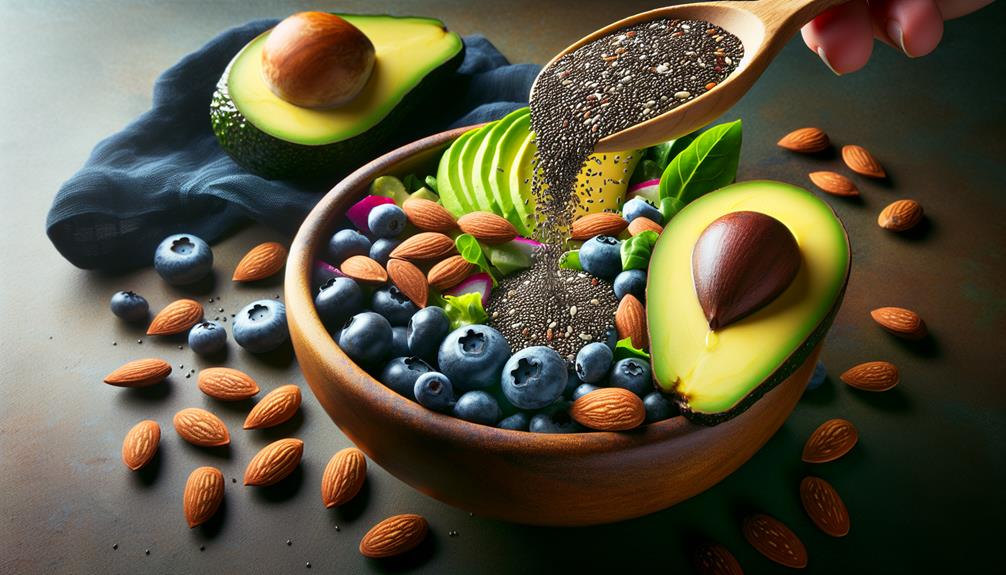
Boost your health with these top 10 superfoods. Berries and broccoli offer antioxidants and anti-inflammatory benefits. Spinach improves bone health and digestion. Avocados supply heart-healthy fats and essential vitamins. Quinoa, a complete protein, is full of fiber and iron. Chia seeds, loaded with nutrients, energize and aid digestion. Matcha enhances focus and boosts metabolism. Sweet potatoes, high in fiber, supports digestion and weight management. You're just on the brink of an enlightening journey of understanding these superfoods' powerful properties and the significant role they play for your health and well-being.
Understanding Superfoods

What exactly are superfoods, you may wonder? The term 'superfood' is a relatively new term referring to foods that offer maximum nutritional benefits for minimal calories. They're packed with vitamins, minerals, and antioxidants, substances that help protect your body's cells from damage.
Superfoods aren't essential potions, but rather offerings from Mother Nature that are incredibly rich sources of essential nutrients. They've been scientifically proven to reduce the risk of chronic disease and improve physical and mental health greatly. You'll find them in all food groups and they're easily incorporated into your diet.
Superfoods range from everyday fruits and vegetables, like spinach and blueberries, to lesser-known foods like quinoa and acai berries. It's important to remember, though, we're not talking about berries in this section.
You'll also find superfoods in the seafood and lean meat categories, such as salmon and turkey. Legumes, whole grains, nuts, and seeds are also on the list.
While superfoods don't replace a balanced diet, they can certainly supplement it, providing an array of health benefits.
The Power of Berries
You've likely heard that berries are good for you, but you mightn't know why.
The nutritional benefits of berries are vast, offering vitamins, fiber, and other essential nutrients.
Additionally, they're packed with antioxidants, compounds that can protect your body from harmful free radicals.
Berries' Nutritional Benefits
Bursting with an array of essential nutrients, berries provide a significant boost to your health and well-being. Their vibrant hues aren't just pleasing to the eye, they're a clear indicator of the wealth of beneficial compounds contained within. They're a deceptively simple solution to enhancing your nutritional intake.
Here's what you're getting when you incorporate these superfoods into your diet:
- Fiber: Berries are packed with fiber, a vital element for your digestive health. It aids in maintaining a healthy weight and lowering the risk of heart disease.
- Vitamins: Particularly high in Vitamin C and K, berries contribute to the health of your immune system, skin, and blood clotting processes.
- Minerals: Berries, especially the darker varieties like blackberries and blueberries, are rich in minerals such as manganese, which is essential for bone health and metabolism.
These compact powerhouses aren't only delicious but also nutritionally dense, providing you with a significant portion of your daily nutritional needs.
If you're after a quick, easy, and innovative way to boost your health, consider the humble berry. It's a compact solution to a complex problem, proving that good things indeed come in small packages.
Antioxidants in Berries
Beyond their impressive profile of vitamins and minerals, berries also offer a potent dose of antioxidants, which are key players in the fight against harmful free radicals in your body. These antioxidants, including anthocyanins, ellagic acid, and resveratrol, act as your body's defense force, neutralizing these damaging free radicals and keeping you in top-notch health.
Anthocyanins, the pigments giving berries their vibrant hues, boast powerful anti-inflammatory properties, reducing your risk of chronic diseases like heart disease and diabetes. Ellagic acid, on the other hand, has shown promise in combating cancer, by inhibiting the growth of cancer cells and arresting their proliferation. Resveratrol is renowned for its anti-aging and heart-health benefits.
Incorporating a variety of berries into your diet ensures you're harnessing the full spectrum of these potent antioxidants. And it's not just about eating them fresh – you can also enjoy them frozen, dried, or in a smoothie.
In our pursuit of health innovation, let's not overlook the humble berry. It's a tiny powerhouse, packed with antioxidants that are instrumental in promoting longevity and warding off disease.
Benefits of Broccoli

Packed with an array of nutrients, broccoli is a powerhouse vegetable that can greatly enhance your health and well-being. It's a remarkable source of vitamins, minerals, and bioactive compounds, which play a pivotal role in maintaining peak health.
Incorporating broccoli into your diet can provide you with a multitude of benefits that are both immediate and long-term. For you, the innovative health enthusiast, here are three key benefits:
- Anti-Inflammatory Properties: Broccoli contains sulforaphane, a potent compound that fights inflammation at the cellular level. This can help reduce the risk of many chronic diseases linked to inflammation.
- Rich in Antioxidants: It's an excellent source of antioxidants like vitamin C and flavonoids which neutralize harmful free radicals, protecting your cells from oxidative stress.
- Boosts Digestive Health: High in dietary fiber, broccoli aids digestion and maintains a healthy gut, which is essential for overall health.
In a world where processed foods are rampant, adopting a diet rich in superfoods like broccoli is a smart and innovative approach to health.
Spinach: A Green Giant
Another superfood you should be adding to your plate is spinach, a true green giant when it comes to nutritional value and health benefits. This leafy wonder comes packed with vitamins A, C, K, and folate, not to mention a healthy dose of iron and fiber. Its low calorie and high nutrient content make it an excellent choice for those seeking to improve their health through diet.
Spinach's benefits are manifold. It supports bone health, aids in digestion, helps maintain good vision, and even boosts cardiovascular health. The lutein and zeaxanthin found in spinach protect your eyes from damaging light waves, reducing risk of age-related macular degeneration.
To offer a more comprehensive understanding, consider the table below:
| Nutrient | Impact |
|---|---|
| Iron | Essential for blood production, carrying oxygen to cells |
| Fiber | Promotes digestive health, reduces risk of heart disease |
| Lutein & Zeaxanthin | Protects eyes against damaging light, reduces risk of macular degeneration |
Unveiling the Avocado

While spinach offers a plethora of health benefits, don't overlook the humble avocado, a superfood that's brimming with nutritional value. This green gem, often mistaken for a vegetable, is actually a nutrient-loaded fruit.
Avocados are an excellent source of healthy fats, particularly monounsaturated fats, which are heart-friendly and help to lower bad cholesterol levels. They're also packed with nearly 20 vitamins and minerals, making them a one-stop-shop for essential nutrients.
Here are a few key nutrients you'll find in avocados:
- *Folate*: This B vitamin is important for cell repair and during pregnancy for healthy development of the baby.
- *Potassium*: Surpassing bananas, avocados contain more potassium, which is essential for maintaining electrical gradients in your body's cells.
- *Fiber*: Avocados are high in fiber, promoting weight loss, reducing blood sugar spikes, and linked to a lower risk of many diseases.
Avocados can be integrated into your meals in a multitude of innovative ways. With its creamy texture and mild flavor, it's a versatile addition to salads, smoothies, and even desserts.
Quinoa: More Than a Grain
You might know quinoa as a trendy food staple, but it's more than just a grain. It's a nutritional powerhouse packed with protein, fiber, and various essential vitamins and minerals.
You'll also find it's a versatile addition to your culinary repertoire, easy to cook and adapt to a variety of dishes.
Quinoa's Nutritional Profile
Packed with essential nutrients, quinoa truly stands out as a superfood – it's not just a grain, but a complete protein loaded with fiber, vitamins, and minerals. This ancient grain, once a staple of the Incas, is now recognized globally for its impressive nutritional profile.
Quinoa is one of the rare plant foods that contain all nine essential amino acids, making it a complete protein source. It's a boon for vegetarians and vegans who are often challenged to find plant-based proteins.
Quinoa's nutritional profile is impressive:
- Rich in Fiber: Quinoa has almost twice as much fiber as other grains. It's beneficial for digestion and can help regulate blood sugar levels.
- High in Iron: Quinoa is a good source of iron, which is essential for blood cell production and oxygen transportation in your body.
- Loaded with Antioxidants: Quinoa is packed with antioxidants that can neutralize harmful free radicals and help fight aging and many diseases.
Cooking Versatile Quinoa
Let's explore the versatility of quinoa, a superfood that goes beyond being a nutritious grain and proves itself as a culinary staple in numerous dishes worldwide. You'll be amazed by how this pseudocereal can transform your meals while boosting your health.
Quinoa is easy to prepare, and its slightly nutty flavor complements a wide range of foods. It can serve as a healthier substitute for rice or pasta, and can be included in salads, soups, and even desserts.
To help you incorporate quinoa into your diet, here's a table detailing how you can use it in different meals:
| Meal Time | Quinoa Recipe | Health Benefit |
|---|---|---|
| Breakfast | Quinoa Porridge | High in Protein |
| Lunch | Quinoa Salad | Rich in Fiber |
| Dinner | Quinoa Risotto | Gluten-Free |
| Dessert | Quinoa Pudding | Low Glycemic Index |
Why Choose Chia Seeds

Often overlooked, chia seeds are a powerhouse of essential nutrients, offering a wealth of health benefits that can enhance your overall well-being. These tiny seeds are packed with dietary fiber, omega-3 fatty acids, and proteins, making them an excellent addition to your innovative health regimen.
With chia seeds, you're not just consuming a food, you're embracing a nutrient-rich superfood that can greatly impact your wellness. Here's why you should incorporate chia seeds into your diet:
- Rich in Antioxidants: Chia seeds are loaded with antioxidants that fight off free radicals in your body, keeping your cells healthy and reducing the risk of chronic diseases.
- Beneficial for Digestive Health: The high fiber content in chia seeds aids in digestion, contributing to regular bowel movements and a healthy gut.
- Boosts Energy and Metabolism: Chia seeds offer sustained energy, helping to boost your metabolism and enhance your physical performance.
Incorporating chia seeds into your meals is remarkably simple – sprinkle them on your yogurt, blend them into your smoothies, or even use them as a thickener in your sauces. It's a small step with significant potential in your journey towards better health.
The Magic of Matcha
You might be surprised to discover that matcha, a finely ground powder of specially grown and processed green tea leaves, is a superfood bursting with health benefits. It's not just a trendy ingredient in your local café's lattes. This potent green powder is a nutritional powerhouse that you should consider incorporating into your own diet.
Rich in antioxidants known as catechins, matcha surpasses regular green tea when it comes to nutrition. It's because you're ingesting the whole leaf, not just the brewed water. The primary catechin in matcha, EGCG, has been shown to boost metabolism, slow or halt the growth of cancer cells, and potentially help prevent heart disease.
Additionally, matcha provides a unique form of caffeine known as theophylline. Unlike the caffeine in coffee, theophylline releases slowly over time, providing a sustained energy boost without the crash.
Moreover, matcha contains a high level of L-theanine, an amino acid that promotes relaxation without drowsiness. It's this unique combination of alertness and calm that has made matcha an invaluable tool for focused meditation and increased productivity.
Ultimately, the magic of matcha lies in its ability to boost your health while invigorating your senses. It's a superfood that truly lives up to the hype.
Sweet Potatoes: A Healthier Carb

You're about to discover why sweet potatoes are deemed a healthier carb.
We'll assess their nutritional value, explore various cooking methods, and observe the health benefits they offer.
Nutritional Value of Sweet Potatoes
Packed with essential nutrients, sweet potatoes stand out as a healthier carb that can remarkably boost your overall health and well-being. This vibrant, versatile tuber is a powerhouse of nutrition, and here's why you should incorporate it into your diet.
Sweet potatoes are rich in:
- Fiber: which aids in digestion, helps control blood sugar levels, and lowers the risk of heart disease.
- Vitamins: specifically, a high level of vitamin A (in the form of beta-carotene), necessary for good vision, immune system, and cellular growth.
- Minerals: including manganese, which supports metabolism and bone health, and potassium that helps regulate blood pressure and water balance.
Despite being a carbohydrate-rich food, the glycemic index of sweet potatoes is relatively low. This means they're a great choice for maintaining steady energy levels and controlling appetite, without causing a rapid spike in blood sugar.
They're also packed with antioxidants that protect your body from free radical damage and chronic disease. It's worth noting that the nutritional content can vary depending on the color and type of sweet potato.
Cooking Methods for Sweet Potatoes
While sweet potatoes are naturally nutritious, the method of preparation can greatly influence their health benefits. Let's explore the most effective cooking methods to optimize their health potential.
Boiling sweet potatoes is one method that retains most nutrients, particularly the water-soluble ones like vitamin C. You'll want to peel them, cut into uniform pieces, and simmer in water until tender. This method preserves more beta-carotene and makes the nutrient more bioavailable.
Another method is steaming. You'd chop the sweet potato into cubes, place in a steamer basket over boiling water, and cover until soft. This process is quick and retains much of the sweet potato's nutritional value.
Baking is also beneficial. It enhances the sweet potato's natural flavors and increases the bioavailability of beta-carotene. However, it can result in a loss of vitamin C due to the high temperatures.
Lastly, consider microwaving. This method cooks sweet potatoes quickly, helping to maintain many nutrients. However, be careful not to overcook, as this can deplete the vitamin C content.
Health Benefits of Sweet Potatoes
Diving into the health benefits of sweet potatoes, it's evident that this vibrant tuber is more than just an important carb choice. Packed with essential nutrients, sweet potatoes are a powerhouse of health benefits you wouldn't want to miss out on.
- Rich in Antioxidants: Sweet potatoes are a great source of beta-carotene, a type of antioxidant that gets converted into vitamin A in your body. This nutrient promotes good vision, boosts immunity, and aids in maintaining healthy skin.
- High in Fiber: The high fiber content in sweet potatoes aids in digestion, keeps you feeling full longer, and therefore helps in weight management.
- Packed with Minerals: Sweet potatoes are loaded with essential minerals like potassium and magnesium, which play an important role in nerve function, muscle control, and maintaining a healthy blood pressure.
Turmeric's Healing Properties
You might not be aware, but turmeric's healing properties have long been recognized in traditional medicine, offering significant health benefits such as anti-inflammatory and antioxidant effects. This vibrant yellow spice, commonly used in curry, is loaded with a compound called curcumin. Curcumin is the star player behind turmeric's therapeutic benefits, and it's a game-changer for your health.
Scientific studies have shown that curcumin can help boost your immune system, providing you with a natural defense against illnesses. It's also been found to improve brain function and lower the risk of brain diseases. Additionally, its antioxidant capacity is so powerful that it can fight off harmful free radicals and protect your body from damage.
| Health Benefit | Description |
|---|---|
| Anti-Inflammatory | Reduces inflammation in the body, aiding in the treatment of conditions like arthritis. |
| Antioxidant | Fights off oxidative damage and boosts the body's own antioxidant enzymes. |
| Brain Function | Increases levels of the brain hormone BDNF, which stimulates the growth of new neurons. |
| Heart Health | Improves the function of the endothelium, the lining of blood vessels, reducing heart disease risk. |
| Cancer Prevention | Curcumin has been shown to prevent and possibly help treat cancer. |
Turmeric isn't just a spice—it's a superfood. So why not incorporate it into your diet and reap the benefits?
Frequently Asked Questions
Can These Superfoods Aid in Weight Loss Efforts?
Absolutely, these superfoods can aid in your weight loss efforts. They're packed with essential nutrients and fiber, which'll make you feel full longer, reduce cravings, and boost your metabolism. So, you'll potentially lose weight healthily.
Do These Superfoods Interact With Any Common Medications?
Yes, they can. Some superfoods like grapefruit and spinach can interact with medications. It's best to consult your doctor before incorporating these into your diet, especially if you're on medication.
Are There Diet Plans That Incorporate All These Superfoods?
Yes, there're diet plans incorporating all these superfoods. They're designed for peak health, blending innovation and nutrition. You'll find these plans in health-focused cookbooks or through a consultation with a registered dietitian.
Are There Any Potential Allergies Associated With These Superfoods?
While it's true that you're what you eat, some superfoods can trigger allergies. So, monitor your body's reaction when introducing new foods. Potential allergens include nuts, soy, and shellfish, found in some superfoods.
What Are Some Easy Recipes for Beginners Using These Superfoods?
You'll find smoothies are a great start, just blend kale, blueberries, and chia seeds. Or try quinoa salads with almonds and goji berries. Avocado on whole grain toast is another quick, nutrient-rich option.




